And You Visited Me
Where do you go next after running with the Saints? The City of Angels, of course. St. Vitus Parish, our apostolate in Los Angeles, was our destination after we took a reluctant leave of San Diego and headed north during the Missive’s 2019 California expedition, a tour of three apostolates that began in San Diego on July 26th and ended 500 miles away in Sacramento on August 5th. L.A. was our second stop.
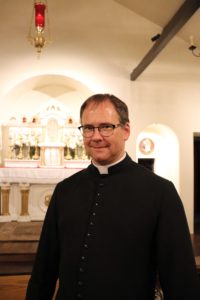
FSSP Los Angeles was founded in 2014 and is the fruit of several years of attempts to found an apostolate that had been stymied by the lack of an available Catholic church. In 2014, the FSSP asked if they could come and try to find an empty Protestant church to convert to the purpose, and Archbishop José Gomez granted permission. Fr. Fryar arrived and worked out of several temporary locations, primarily St. Victor’s in West Hollywood, before they at last found their own church in San Fernando in north Los Angeles. Archbishop Gomez dedicated the church of St. Vitus in June of last year and raised it to the rank of a parish.
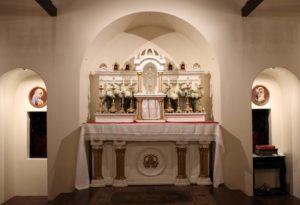
The only problem – if you can term it a problem – is that the parish has already outgrown the space, with indicators that the congregation would grow even more if they had more room. The church is full to overflowing four times a Sunday, with a total count of 400-450 (the church seats 120) after the priests saw the numbers double with the addition of the fourth Mass. For Holy Week this year, the parish set up a 500-person tent outside, with 400 people attending the Easter Vigil and around 700 over the week. But this is not an uncommon problem among Fraternity apostolates, and St. Vitus is approaching the issue as any other apostolate would: by raising money and getting a bigger church, hopefully by building one. They intend to stay in San Fernando, as it has proven to be a good part of the city for a number of reasons, among which is that it is amenable to most parishioners in terms of the infamous L.A. traffic (which is not to be trifled with; it can add 60+ minutes onto a trip during rush hour).
The music program at St. Vitus is particularly strong. The two choirs (one for each Sunday High Mass) are run by director Jeff Ostrowski, who had previously collaborated with the Fraternity to produce the St. Edmund Campion Missal & Hymnal, a common sight in Fraternity pews. The parish also hosts the annual Sacred Music Symposium, a week of training for choir directors and singers that takes place in June and features instruction from world-class musicians.
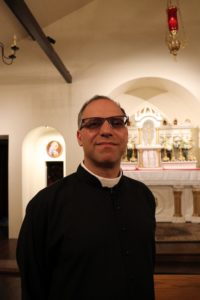
But perhaps the most thought-provoking ministry of our L.A. apostolate is its prison ministry, which, if most of us have perhaps heard the term, is not something we necessarily come into contact with on a daily basis. Fr. Federico Masutti, who is in his third year as assistant pastor, is priest-in-charge of the operation, which takes place at a large L.A. County state prison. He travels there regularly, primarily to offer the Sacrament of Confession to the inmates, and he has also celebrated the traditional Mass there several times. The ministry began when an inmate who had heard about the traditional Mass requested that a priest come to see him. Fr. Masutti considered it a good opportunity to assist with the needs of the Archdiocese; he said that it’s always good for the priests of the Fraternity to show that they can help with the priestly duties – such as hospital calls and chaplaincies – in the different dioceses where they are located.
There is a large Catholic population at the 5,000 person prison, said Fr. Masutti, but many are fallen away. He explained that a great need for prison ministry exists across the United States, as there is a scarcity of priests and the logistics are often difficult due to the remote location of most prisons. He considers it important to maintain a Catholic presence in the prisons, as many of the Catholics don’t have the opportunity to receive guidance and instruction in the Faith and there is a danger of them losing the Faith. But he says that there is much that can be done despite the difficulties, and even the parishioners at St. Vitus have lent their assistance by making rosaries and donating Catholic books for the prisoners.
Of course, a stereotype often comes to mind when we think of prisons, the images evoked involving, perhaps, maximum security facilities, dark halls, gangs, etc. But Fr. Masutti explained how his experiences at the L.A. prison dispelled those ideas, to the point that sometimes it’s easy to forget that you are in a prison facility. He recounted a memorable experience that occurred early on in his ministry. As he was preparing to hear Confessions in a classroom at the prison, one of the inmates simply smiled and said, “Good morning, Father.”
“From that moment on, everything changed in me,” said Fr. Masutti. “Everything disappeared when I saw that human element.”
Furthermore, he finds it moving to see how much the inmates desire to receive the Sacrament of Confession, and how happy they are to see a priest.
“It’s very rewarding spiritually,” he said.
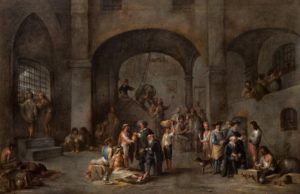
Fr. Masutti also addressed a question that probably arises in the minds of many of us when we consider how many young people end up in prison: Why are they here? These are people who are young and healthy. They are capable of working and have obvious talents: some take art classes at the prison and produce beautiful drawings. In a word, they have all kinds of potential, but instead of building successful lives for themselves, they somehow chose to go down a path that landed them in prison. Why? Fr. Masutti notes that many of them come from broken families.
“And that’s why family life is key,” said Fr. Masutti. “A government should protect the institution of the family, because most of those people there, I would say a very high percentage, they don’t have families . . . they are all broken families.”
He says that another problematic element of prison life is that, for the most part, these prisoners don’t get any visits, abandoned by those who know them on account of their crimes.
“They don’t get anything,” Fr. Masutti said with emphasis. “Because of the crimes that they committed before, a lot of people don’t [want to have] anything to do with them. But then it’s easy to forget. You don’t want to go to that environment, you don’t want to be there.”
He continued by quoting Matthew 25, where Our Lord speaks of the corporal works of mercy, among them, visiting the imprisoned. In that passage, Our Lord identifies Himself with the suffering and the imprisoned, saying that, when we visit them, we visit Him.
“All of us,” Fr. Masutti explained, “in one way or another, according to the circumstances that we have in life, we need to live those corporal works of mercy. Because those are the things in which Our Lord is going to judge us at the Last Day.”
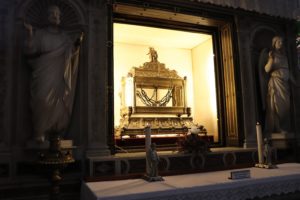
Fr. Masutti mentioned that many saints, and even Our Lord Himself, were in prison. We were speaking to Fr. Masutti on August 1st; our final challenge to you is to go grab a pre-1960 missal and look up the old feast for that day. +
Then the righteous will answer Him, ‘Lord . . . when did we see thee sick or in prison and visit thee?’ And the King will answer them, ‘Truly, I say to you, as you did it to one of the least of these my brethren, you did it to me.’
– Matthew 25:37, 39-40
September 30, 2019








